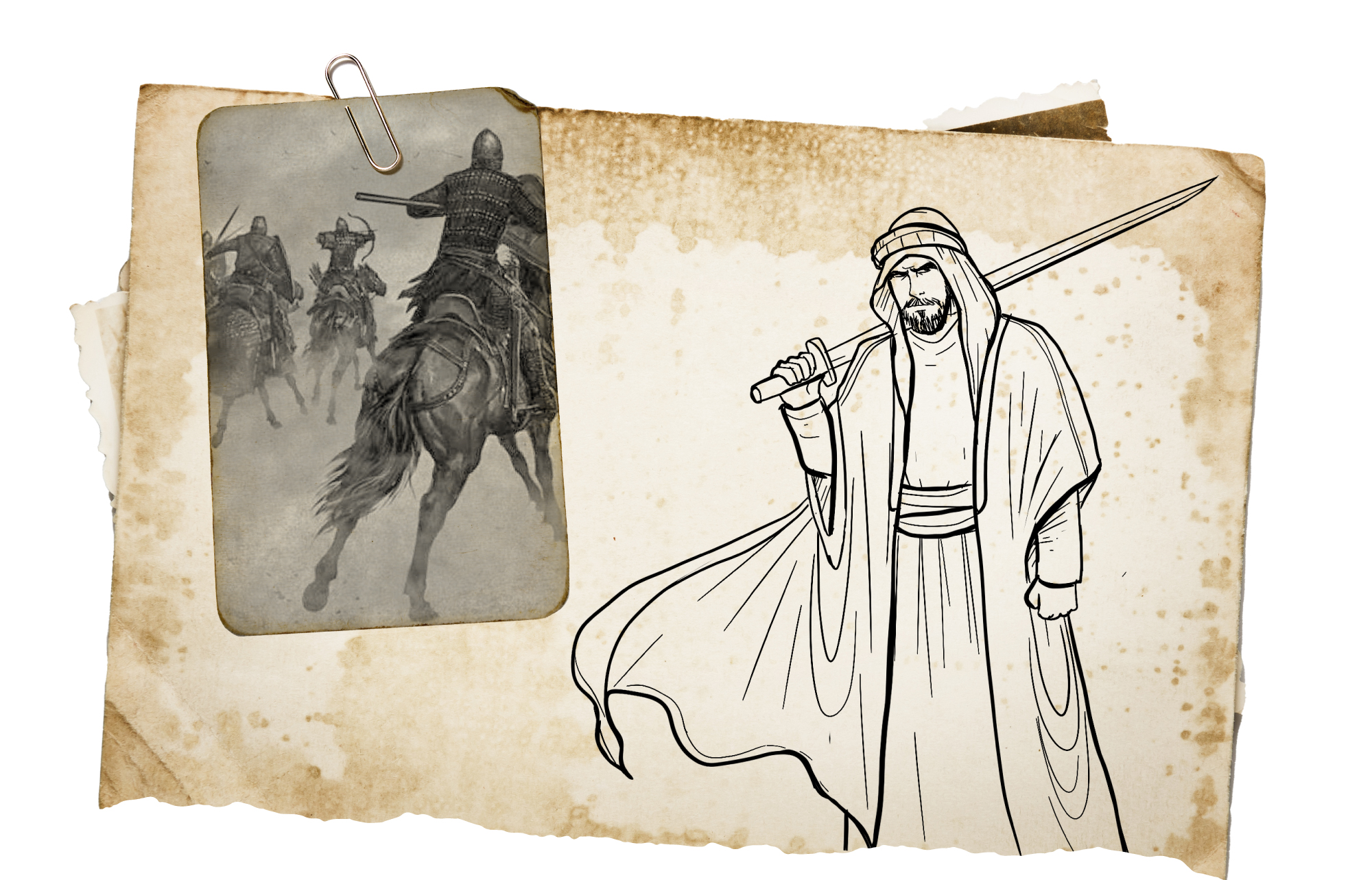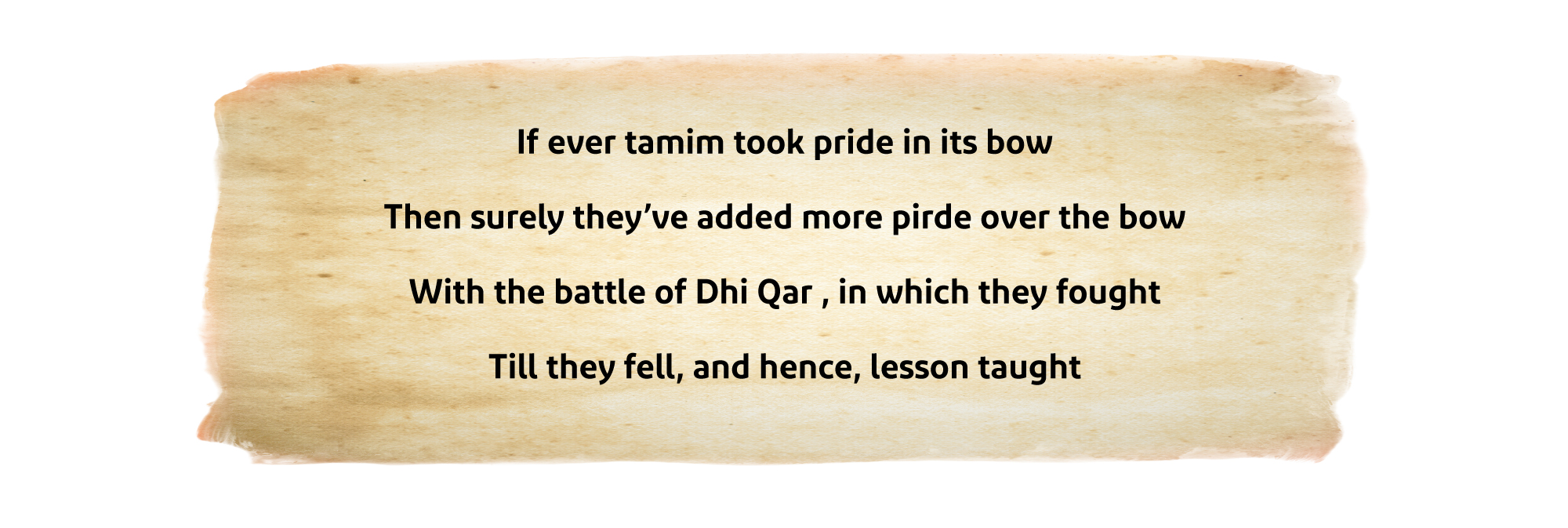
Dhi Qar
A battle that led the Persians to hide behind populism and heresy and practice intrigues and conspiracies
The Battle of Dhi Qar was a turning point between the Arab tribes, especially Bakr Ibn Wael tribe and those who allied with it, which suffered greatly from the domination of the Sassanid Empire and its tyranny for many years over its position and capabilities, and even over its religious beliefs. The Persians made Arab tribes fuel for the international conflict between the Persian and the Roman empires by creating an Arab province that protected the frontiers of the great power. Despite the preference and relative freedom given to some of the princes of the Arab Kingdom of Al-Hira by Khosrau, their prevailing view of the Arabs was a condescending and inferior view and that they were followers, subjects and tools used in events, crises and times of need only.
The importance of Dhi Qar lies in its national manifestations. For the first time in history, the Arabs dared to meet the Persians in a great open battle, and their morale strengthened. Although a number of Arab tribes were loyal to the Persians, their feelings were with the Arabs. This is evidenced when Iyad tribe retreated from helping the Persian army at the decisive time of the battle, and Banu Al-Sukoon and some of Banu Tamim tribes joined with Bakr Ibn Wael and Shayban tribes against the Persians.
The Arabs immortalized their victory over the Persians in historical and literary memory.

The Arabs immortalized their great victory over the Persians with pride in many poems in the pre-Islamic era and in Islam. After Al-A’sha’s poem, there is a poem by Abu Tammam praising Abu Dulaf Al-Ijli:

After Dhi Qar, the Arabs were no longer afraid and their morale rose until they were able to threaten the borders of the Sassanid Empire. The effects of the eternal battle were reflected on the increase of unity and cohesion among the Arab tribes for the first time against the Magian Persian enemy with all strength and composure. The defeat of the Persians was a painful blow to Khosrau, who was unable to regain his prestige again on the Arabian Peninsula, which was able to unite the tribes and settle in Bahrain. The Arabs were no longer afraid of the Persians as they used to. Perhaps this great defeat that the Persians received was for a purpose that Allah knows. Who examines the date of the battle, according to what many of the chroniclers mentioned that it took place shortly before the Prophet Muhammad, may Allah’s prayers and peace be upon him, was sent, and this raises the question of the timing of that battle? There is no doubt that the Arabs were waiting for a great matter, a great event, and a great responsibility that was placed upon them when they entered Islam, which is to inform Islam to the world after Allah Almighty preferred them over all the nations, and on the other hand, so that there would be no prestige for the Persians and their empire as it was. Whoever reads the biographies of the Companions is fully aware of how this prestige was stripped from the Persians, and that one of the results of the Battle of Dhi Qar was that it paved the way for a new beginning and a starting point for the battles of the Islamic conquest of Persia since the era of the Rightly-Guided Caliph Abu Bakr Al-Siddiq, may Allah be pleased with him, and under the leadership of the great companion Khalid Ibn Al-Walid until the conquest of Iraq. Khalid Ibn Al-Walid turned to the Levant Front to fight the Romans, but the Persian raids on Iraq continued until they recovered a large part of it, so the Muslims returned to fighting the Persians under the leadership of Saad Ibn Abi Waqqas. The prestige of the Persians was erased in the Battle of Al-Qadisiyyah, and the Persians lost the western part of their empire, but the Persian raids did not stop. Caliph Umar Ibn Al-Khattab decided to focus the Islamic military efforts on the Persians after the Battle of Al-Qadisiyyah until they subjugated the entire Persian Empire in less than ten years. That was the end of the Persian Sassanid myth, which continued to terrorize the ancient world, including the Romans, Greeks, Arabs, and others.
It is inevitable that the battle of Dhi Qar, with its achieved results and its wide impact, forever destroyed the Persian Magian pride that had been hiding behind populism, heresy and other false claims. Now, they are practicing intrigues and conspiracies against the Arabs and Islam in twisted ways because they are unable to confront directly again.


- Tawfiq Berro, The Ancient History of the Arabs, 2nd Edition (Beirut: Dar Al-Fikr, 1996).
- Elsayed Abdel Aziz Salem, History of the Arabs in the Pre-Islamic Era (Beirut: Dar Al-Nahda Al-Arabiya for Printing and Publishing).
- Lotfy Abd Al-Wahhab Yehia, The Arabs in Antiquity (Alexandria: Dar Al-Marefa Al-Jami’iyya, 1996).
- Muhammad Suhail Taqqosh, History of the Arabs before Islam (Beirut: Dar Al-Nafa’is, 2009).
- Yaqout Al-Hamawy, Lexicon of Countries (Beirut: Dar Sader, 1957).
